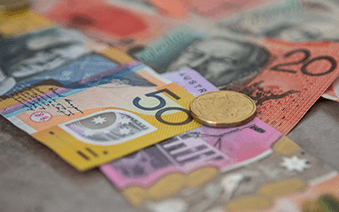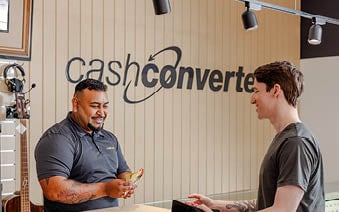The circular economy is a worldwide movement known to many, but depending on where you live, the practice and the stage it’s in differs. In Australia, we’re on the right path – but there’s still a lot of work to do to reach that mutual goal.
Find out how the circular economy affects us and where our country currently sits on the journey to creating a better world.
The circular economy is all about the nine 'R's – and in Australia, we're hitting 'Recycle' and 'Recover' hard. Some Rs are consistent throughout every country, whilst some are less common than others because they may be harder to practice. But for it all to work, everyone needs to come together and do their part.
Learn to say no to things you don't need. It might be hard to turn down single-use plastics because we’ve become so used to it, but little tricks can help. Try to find a reusable cup that you’ll be excited to take out and use. Very soon, it’ll be second nature to grab it without thinking.
Challenge the status quo. Just because it is, doesn’t mean it’s right. Think about how things are made and used – can we do it better and with less impact? What are we better off buying second-hand?
Give things a second chance before tossing it out. Can it be used again? Even if not by you, allow somebody to reuse it. Not everyone is looking for new, some are looking for vintage. You never know who could benefit from something like mobile phone recycling.
If you’re hands-on and a lover of DIY, have a go at fixing things up instead of throwing them away. A broken chair or a faulty gadget doesn't have to end up in landfill.
.
Second-hand reseller hubs are a great place to see what a little refurbishing can do. You also can get ideas from the creativity of others when you’re stuck with how to upgrade and refresh an item. Take old things and give them a modern twist – it's like a makeover.
Take old items, break them down, and make new ones. Parts can be sourced from these products to be used for something else.
.
Falling under the umbrella of remanufacturing, repurposing means turning something old into something new. That old ladder might make a great bookshelf, or that unhinged door could be a table.
The classic move, but still an important one. We all know what part we need to play to recycle goods properly, but as a reminder, there are a few tips you can follow to ensure your efforts of recycling in Australia don’t go to waste.
.
Don’t worry, we recognise that sometimes rubbish is just rubbish. But in a last-ditch effort, look for signs that an item may be recoverable. Find where you can extract value from waste. Even what seems useless might have hidden treasures.
Every country has its own green moves, making it all a sustainability potluck. Some focus on different stages of the key R’sRs in environmental change due to cultural and geological factors, but overall, the drive to be sustainable can be found within many communities.
How is Australia riding the circular wave? We're certainly paddling in the right direction, with Aussies being quite keen to reduce waste. Although we’re not at the finish line and the journey will take time, we're making impactful strides towards the goal of more circular processes.
As a country, we’re not just hanging back; we're actively diving into the circular economy the best we can. With plans to aim for an 80% average resource recovery rate from all waste streams by 2030, here are just a few of the many circular efforts from some Australian businesses that will help get us to this goal and the types of R’s that they’re hitting off:
An Australian company specialising in recycling plastics, Replas creates a wide range of products, including outdoor furniture, decking, and signage. They use advanced technology to convert plastic waste into durable, long-lasting products. This process earns Replas a place in the circular economy because of their efforts to transform plastic waste into new products, closing the loop and reducing the demand for traditional, new materials.
R’s: Remanufacture, Recycle
Yume is an Australian startup tackling food waste in the hospitality industry. They've created a marketplace connecting surplus food from suppliers with buyers, reducing food waste and providing cost-effective options for businesses. Yume contributes to the circular economy by preventing food from going to waste, prolonging the life cycle of edible goods and minimising environmental impact.
R’s: Reuse, Recover
This company has been at the forefront of promoting recycling and sustainability since 1992. They've created initiatives like 'Cartridges 4 Planet Ark', encouraging the recycling of printer cartridges, and the 'Australasian Recycling Label,' providing people with clear information about package recycling. By pushing for responsible disposal and recycling of products, Planet Ark plays a role in the circular loop by ensuring that materials are recovered and reused.
R’s: Reuse, Recover, Recycle
At Cash Converters, the role we play in the circular economy is through our business model that focuses on buying and selling second-hand goods. We operate a network of stores across Australia and worldwide where people can sell their items and buy second-hand, ranging from electronics to furniture. By providing a hub for people to trade in and buy pre-loved goods, we’re helping to extend the lifespan of many products and give them a second life.
Our R’s: Reuse, Repurpose
Aside from Australian businesses, the public are also doing their part as individuals, with 51% of Australians wanting more sustainability and 62% wanting more ethically made products.
As they say, it’s easier said than done when changing lifestyle habits for the greater good. If you’re someone who’s switched to reusable bags but is finding it hard to make the change to second-hand items instead of buying new ones, then it might feel like you’re not doing your part.
Of course, no party's without its hiccups. While Australia is working towards a circular economy, we also have our challenges.
Australia's vast and widespread population is why it may be harder to put focused circular economy systems in place. The transportation and collection of materials can be harder and more costly compared to highly populated countries.
Not to mention, Australia's economy has relied heavily on the extraction and export of natural resources. So, trying to get to a circular economy through sustainable resource extraction can be economically challenging.
Other things like regulations that make it harder to enforce circular practices, businesses being unable to adopt circular changes, or finding it hard to get on board as an individual can make it all difficult. There are a lot of systems in place that have been set up for convenience, and convenience doesn’t always come with a conscious lifestyle.
While other countries might be doing the nine 'R's a bit better than us, Aussies can never say no to joining in on the fun.
Whether it's recycling or giving old stuff a new gig, every little thing counts. The circular economy is a party that we can all be part of.
.

Answering your questions about loans and staying savvy

Get more bang for your buck with these handy tips.

Need some advice that’s not about cash? We can help.